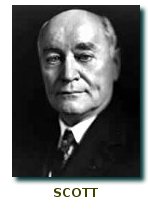 book published two years after his death, HeinrichLammasch,
minister-president of Austria in 1918, expresses this
view:
book published two years after his death, HeinrichLammasch,
minister-president of Austria in 1918, expresses this
view:
Thursday, February 19, 2009
Page 15
REMINISCING (Column)
James Brown Scott: Scholar, Author, Diplomat, Teacher
By ROGER M. GRACE
If you go to an enclopedia, you’re almost certain to find an article on James Brown Scott.
Depending on which encyclopedia you look at, it might mention that he founded the law school that would soon belong to USC. It is apt to note that he served as dean of the law school at the University of Illinois from 1899-1903, and was a professor of law at Columbia University at the time of his appointment in 1906 as solicitor of the State Department (a post he held for four years). It’s bound to allude to his status as an expert in international law, and perhaps tell of his leading role in promoting international arbitrations. It will surely set forth his service as secretary of the Carnegie Endowment for International Peace from 1910-40 and his presidency of the American Society of International Law from 1929–39.
Yet, Scott’s name recognition has withered since his death in 1943.
Writing in the April, 2008 issue of the Journal of Gilded Age and Progressive Era, John Hepp says of Scott:
“Notwithstanding the important role he played in the first few decades of last century, few know his name today. Even historians of American foreign policy would have trouble identifying his many key positions in the growth of public international law in the United States from the 1890s through the 1930s. But he was well-known among his contemporaries as a spokesman for this new discipline. Scott rose from obscure middle-class origins to occupy an influential place as an international lawyer who shared his legal expertise with seven presidents and ten secretaries of state.”
Here follows a look at Scott following his departure from Los Angeles.
In 1899—the year he left the Los Angeles Law School and became dean in Illinos—he
served as a delegate to the
HaguePeace Conference. In a 1922 book published two years after his death, HeinrichLammasch,
minister-president of Austria in 1918, expresses this
view:
book published two years after his death, HeinrichLammasch,
minister-president of Austria in 1918, expresses this
view:
“[I]n 1899, the soul of the American delegation was that member who had no vote and was not a plenipotentiary, namely Professor James Brown Scott….”
Scott in 1906 not only played a meaningful role in establishing the American Society of International Law, but gained approval that first year of establishing under its auspices the first English-language periodical dealing with arbitration and adjudication of disputes between nations, the American Journal of International Law.
The society still exists, as does its journal.
A 1982 article by John M. Raymond and Barbara J. Frischholz, appearing in that periodical, says that Scott “more than any other individual, was responsible for the existence of the Society and its Journal,” editing the publication from 1907-24.
Preceding Scott as president of the society were Elihu Root—who, during his time as president, 1907-24, was secretary of state, then United States senator from New York—and Charles Evans Hughes, president of the group from 1924-29, also secretary of state at the outset… in 1930 becoming chief justice of the United States. The immediate successor to Scott was Cordell Hull (1939-42), also secretary of state when his presidency began.
Scott was a technical delegate (his technical field being international law) to the second Hague Peace Conference in 1907.
Scott had not abandoned his role as a teacher. An Aug. 12, 1907 article in the Atlantic Constitution notes that Scott was then a professor of international law and diplomacy at George Washington University…which the article notes was serving as a training ground for diplomats, with courses being taught by two sitting members of the U.S. Supreme Court and a former secretary of state. Scott conducted lectures at John Hopkins in 1909.
He was a special advisor to the State Department from 1914-17.
In 1918, Scott authored a book—one of a good many by him—on relations between the United States and Germany. A Feb. 24 review in the Atlantic Constitution remarks: “Excepting the secretary of state, there is probably no man in the United States who knows more about this subject than Dr. Scott.”
Scott and David Hunter Miller were legal advisers to the U.S. delegation to the Paris Peace Conference in 1919, following World War I. They were involved in formulating drafts of the Treaty of Versailles, including the provision for the League of Nations. The end-product clearly was not to the liking of Scott. A departure by him from diplomacy—indeed, a straight-forward blast at the peace treaty—is recited by Godfrey Hodgson in his 2006 book, “Woodrow Wilson’s Right Hand”:
“The American delegates were all in one way or another unhappy about the treaty. Its legal expert, James Brown Scott, passed a severe judgment: ‘The statesmen have…made a peace that renders another war inevitable.”
Scott died at his home in Wardour, Md. which he had dubbed “Few Acres.”
Copyright 2009, Metropolitan News Company